Indonesia is an archipelago of more than 17,000 islands; it has some of the most spectacular scuba diving sites in the world. Located within the Coral Triangle, it is home to some of the richest marine life anywhere in the world. Some of the popular locations are Bali, Komodo National Park, Raja Ampat, and Gili Islands, all offering a different type of underwater experience. Scuba Diving in Indonesia never fails to thrill, with something for every diver’s interest — from the whimsical beauty of colourful coral gardens to spectacular walls and a heap of muck diving sites in pursuit of special critters.
Factors That Affect Scuba Diving In Indonesia
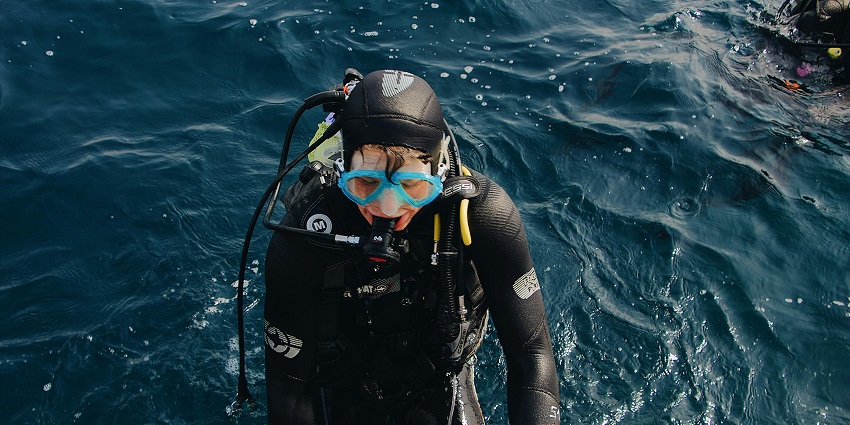
Photo: Maël BALLAND / Pexels / Image For Representation Only
When planning for scuba diving in Indonesia, several important factors can influence your experience, such as:
- Health Conditions
- Weather Conditions
- Water Levels
- Aquatic Life
- Safety Precautions
Suggested Read: Discover The Thrill Of Scuba Diving In Bali For An Adventurous Vacation
Levels Of Scuba Diving In Indonesia
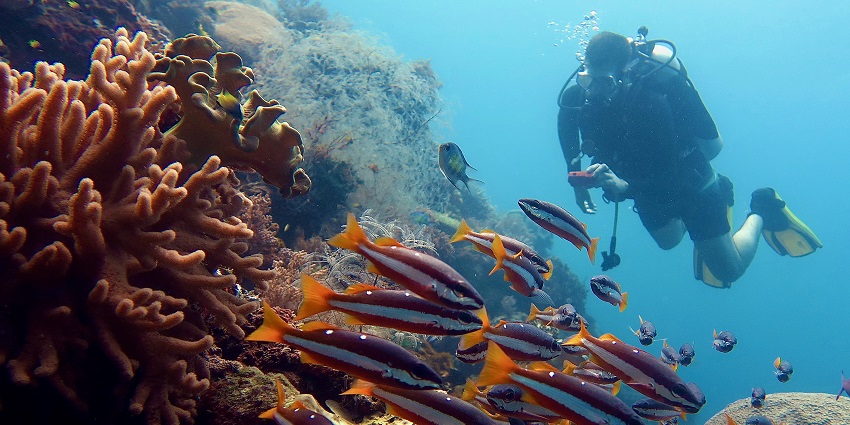
Photo: Fakhrizal Setiawan / Wikimedia Commons
There are various levels of scuba diving in Indonesia for all divers, whether at primary or advanced expertise levels. These are as follows:
Beginner (Open Water Diver)
This level is ideal for those beginners who can dive up to 18 metres, or 60 feet. This is the first level of certification for recreational scuba diving: some classroom sessions, confined water training, and 4 open water dives. Places that are very good for these first dives, with clear waters and a variety of marine life, are Bali, Gili Islands, and Komodo National Park.
Duration: 2 – 3 days
Intermediate (Advanced Open Water Diver)
For those already holding an Open Water certification who want to dive deeper—to 30 meters or 100 feet—and reach sites that hold more difficulties. This course allows you to try various types of diving, such as deep diving, underwater navigation, and night diving, among many others. Dive the best of Balinese diving in Nusa Penida for the mantas and the wreck of the USAT Liberty in Tulamben.
Duration: 4 – 5 days
Advanced (Rescue Diver, Divemaster, And beyond)
This is for experienced divers looking to enhance their skills, undertake rescue operations, or pursue professional diving qualifications. This might be done in regions of unpredictable weather and strong currents and thus require sufficient experience. Raja Ampat for its diverse and remote diving sites, and Alor for its pristine and challenging underwater landscapes.
Duration: 1 week
Popular Destinations For Scuba Diving In Indonesia
1. Bali

Photo: Jun V Lao / Wikimedia Commons
Bali is the best scuba diving destination in Indonesia and one of the best in the world. Visitors can discover the historic artefacts in Liberty Wreck, the impressive underwater Mount Agung, Coral Garden’s colourful corals, and rare marine life, or the stunning rock cluster at Batu Kelebit. The Tulamben site is especially fascinating because it allows you to explore the wrecks of the ships and other WWII ammunition at the bottom of the deep blue Bali Sea. Another important feature here is that divers are not crammed into large groups; guides take only two divers per session so that complete attention can be paid to them.
Minimum Depth Level: 5 metres
Maximum Depth Level: 30 metres
Highlights: Diverse marine life, wreck diving, and easy access.
Suggested Read: Bali Water Sports For A Thrilling Experience
2. Komodo National Park
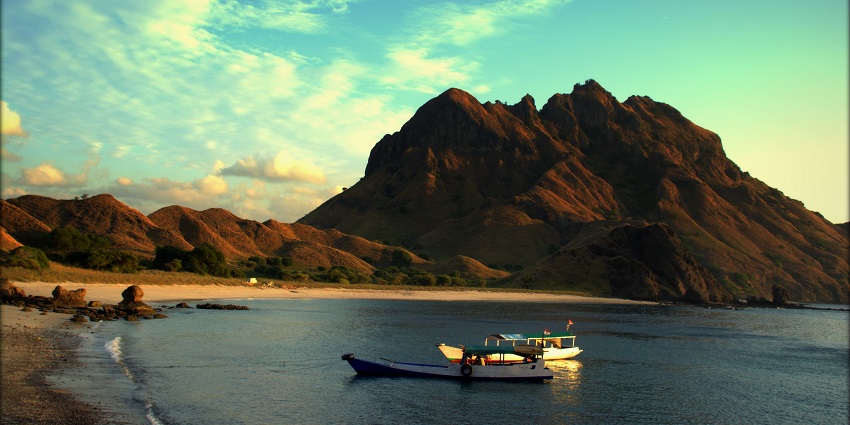
Photo: Triayusept / Wikimedia Commons
Komodo National Park is located in the centre of the Indonesian archipelago and consists of some of the most incredible underwater biodiversity on the globe, along with some of the most challenging diving conditions. Located in the Coral Triangle, which offers the richest marine biodiversity on earth, the park has two different parts: North Komodo, with its warmer waters at 30 degrees Celsius, and South Komodo, a bit cold, ranging from 21 degrees Celsius. Komodo National Park offers some of the most exciting and rewarding dive experiences one can have on the planet.
Minimum Depth Level: 3 metres
Maximum Depth Level: 40 metres
Highlights: Strong currents, large pelagics, and vibrant coral reefs.
3. Raja Ampat
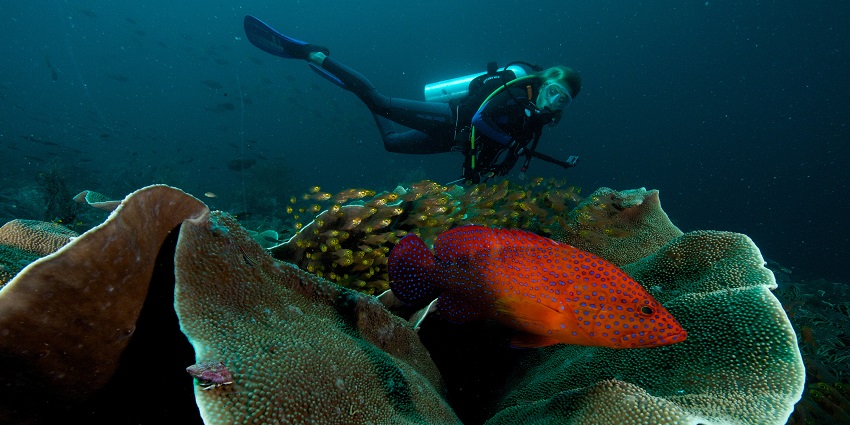
Photo: Buena Ventura / Wikimedia Commons
Located in the West Papua province of Indonesia, Raja Ampat is often considered one of the top diving spots in Indonesia. With its exceptional marine biodiversity, pristine coral reefs, and most of all, remote and untouched dive sites, Raja Ampat is a destination for scuba divers at all levels. One of those places not to be missed in Raja Ampat is The Passage. This very special dive site features a narrow channel, mangroves, caves, and tunnels between Waigeo and Gam Island. But it needs some caution since the high and low tides influence a lot in diving conditions.
Minimum Depth Level: 5 metres
Maximum Depth Level: 25 metres
Highlights: Pristine reefs, exceptional biodiversity, and remote locations.
Suggested Read: Best Spots For Scuba Diving In Gili Islands
4. Gili Islands
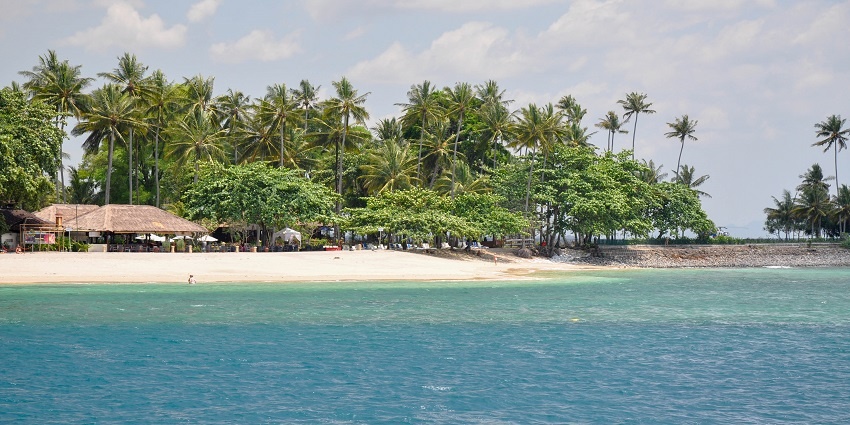
Photo: Jorge Láscar / Wikimedia Commons
The Gili Islands, located off the northwest coast of Lombok, Indonesia, are renowned for their beautiful beaches, vibrant nightlife, and, most notably, their exceptional scuba diving opportunities. The three main islands, Gili Trawangan, Gili Meno, and Gili Air, each offer unique diving experiences suitable for divers of all levels. The site is known for its gentle slopes and diverse marine life, including white-tip reef sharks, turtles, stingrays, and large schools of trevally, making it suitable for beginners and experienced divers. The Gili Islands host numerous dive shops and schools, catering to all levels of divers.
Minimum Depth Level: 5 metres
Maximum Depth Level: 25 metres
Highlights: Beginner-friendly sites, sea turtles, and vibrant coral gardens.
5. Wakatobi
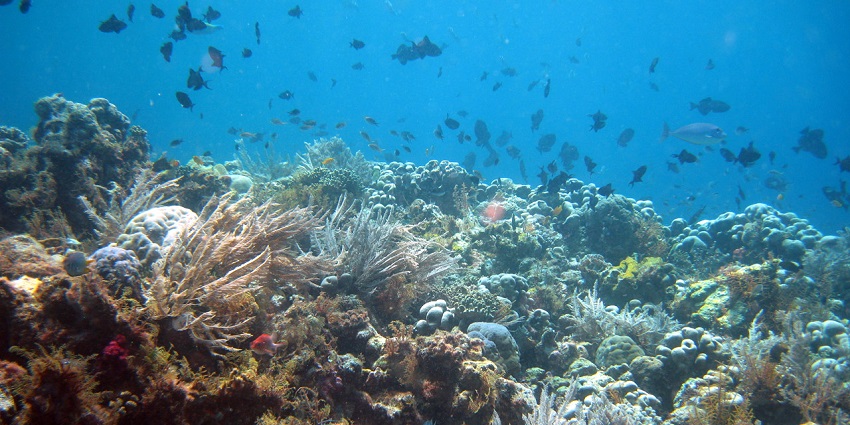
Photo: Craig D / Wikimedia Commons
The Wakatobi National Park encompasses four main islands: Wangi-Wangi, Kaledupa, Tomia, and Binongko, hence the name WaKaToBi. This area is part of the Coral Triangle, known as the global centre of marine biodiversity. These vibrant coral gardens offer a diverse range of marine life, including pygmy seahorses, and stunning underwater topography. There are also a number of premium resorts and restaurants near the Wakatobi diving site that offer world-class facilities and authentic Indonesian cuisine for a mesmerising experience. Despite its remote location, Wakatobi is accessible via direct flights from Bali to Wangi-Wangi, followed by a boat transfer to your resort.
Minimum Depth Level: 10 metres
Maximum Depth Level: 25 metres
Highlights: Pristine coral reefs, extensive marine biodiversity.
Suggested Read: Scuba Diving Gili Trawangan For Underwater Expedition
Best Time For Scuba Diving In Indonesia
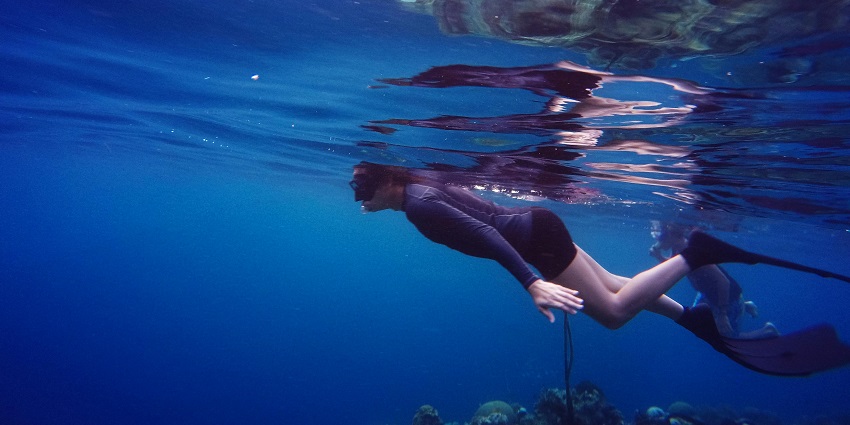
Photo: John Cahil Rom / Pexels / Image For Representation Only
The best time for this activity varies from place to place. Most of Indonesia’s diving places are at their best during the dry season, from April to October. During this period, one can expect clear visibility, sea calmness, and a greater possibility of seeing large sea animals such as mantas and sharks. While it is still okay to dive during the wet season from November to March, some areas may offer less visibility and rougher seas. Some regions, like Raja Ampat, may still be good for diving during this period.
Price Of Scuba Diving In Indonesia
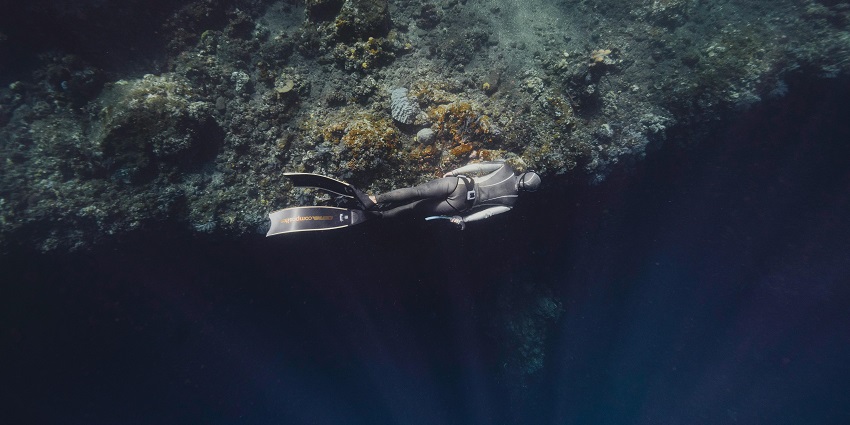
Photo: Emma Li / Pexels / Image For Representation Only
The price of scuba diving in Indonesia differs according to the level. Courses for beginners may cost approximately $300-$500 for a 3-4 day course including equipment rentals and certification. If you just want to get a few dives in, this could be $30-$50 per dive, with discounts often available for multiple dives or dive packages. It continues to vary based on preference and place.
Suggested Read: The Best Adventure Sports In Bali To Try On Your Next Vacation
Scuba Diving in Indonesia is truly a thrilling experience like no other. These popular diving destinations offer a range of depths suitable for different levels of divers, from beginners to advanced. The diverse marine life, vibrant coral reefs, and unique underwater landscapes make Indonesia a premier diving destination. Book your tickets with TripXL now to experience Indonesian Scuba Diving and discover the blue sea.
Cover Photo: Thomas Fuhrmann / Wikimedia Commons


 WhatsApp
WhatsApp
 Twitter
Twitter









